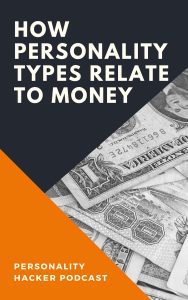Download Episode Here – right click link and select “Save Link As…”
In this episode Joel and Antonia talk about how different personality types relate to money, wealth, and finances.
In this podcast you’ll find:
- Hardwired for Wealth
- Money is a weird, abstract thing that we have built a lot of symbology around.
- Money is emotional. It is the real currency we use to get our safety and security needs met.
- One of the most useful tools to look through to gauge each types trending relationship with money is by looking at their judging cognitive functions.
- Our Judging function is how we determine how things should be.
-
Extraverted Thinking (Te) – Effectiveness – All TJs use this as a strength – “What Works?”
- They see money as a tool to accomplish tasks. A resource to manage.
- Te doesn’t usually demonize money because they see it as a useful resource.
- The biggest issue with Te is not making money the highest priority.
- The best way to not only generate the resource to get the outcome you want but also no alienate others is to have regular check/balance analysis. Remember why you are earning money. It is a tool, not the main event.
-
Extraverted Feeling (Fe) – Harmony – All FJs use this as a strength – “What gets everyone’s needs met?”
- Fe sees money as a way to meet the needs of others. Most Fe users have a relatively healthy view of money.
- The area they get into trouble is if they can meet a human need by throwing money at it, sometimes the overarching scale of “Do we have enough” is ignored in preference of getting someone’s need met.
- Ideally, Fe should zoom out and get needs met over time by being responsible with money.
- Stress causes them to be more indulgent.
- Human need is seen as the highest priority. They will do anything to lift morale.
-
Te/Fe couple approached by someone who needs money – Te says “I’d love to help them out, but we have to stick to the budget.” Fe says, “Of course I will solve your need! Just like I solved someone else’s need last week.”
- Fe prioritizes whoever has the most intense need. Very generous!
- Fe can grow in their relationship to money by saying, “No.” Te can grow by saying, “Yes.”
- It is rare when Te/Fe demonize money.
- Extraverted Judging helps them recognize the value and need for money in the outside world.
-
Introverted Feeling (Fi) – Authenticity – All FPs use this as a strength – “What makes sense to me?”
- Money can be a very personal, subjective experience for Fi users.
- The Polar opposite of Fi is Te.
- Most Fi users know that money is necessary on some level, but because it causes dehumanizing situations or brings up negative behavior, Fi users often see money as harmful.
- Fi can see the internal struggle to sell out for money and they attempt to absolve personal issues by projecting outward.
- Don’t demonize the tool. It is simply a way to facilitate something. Try creating a healthy relationship with the concept.
- Do we impute negative intent to someone with money? Or do we assume people without money are untrustworthy?
- Is our bias about money coloring how we engage with other people?
- Is our bias about money coloring our perspective so much that we cannot even have an open conversation around money?
-
Introverted Thinking (Ti) – Accuracy – All TPs use this as a strength – “What makes analytical sense to me?”
- Ti recognizes how money has its tendrils spreading out over everything. Ti users don’t seem to have as emotional a connection to money as the other types. They can go either way based on subjective experience.
- “Why do I have to create money to be viewed as valid?”
- One degree of separation from money. Neutral.
- Ti’s Healthiest relationship with money is thru gamifying it. To make it interesting.
- Polar opposite of Fe – Harmony
- Ti recognizes that money gets people’s needs met. Money is the way we facilitate the lives of the people we love.
- Why do we care? We can’t have honest conversations until we recognize what our personal relationship with money is.
- When we are highly emotional about anything, we believe in ideals that are not realistic.
- Don’t turn money into the monster. Money isn’t the problem. It is our relationship with money that is the problem.
Exercise: Write in your Journal “I see money in my life as….”
To subscribe to the podcast, please use the links below:
Subscribe with iTunes
Non iTunes Link
Download The Android App
Subscribe on Soundcloud
Subscribe with Stitcher
If you like the podcast and want to help us out in return, please leave an honest rating and review on iTunes by clicking here. It will help the show and its ranking in iTunes immensely! We would be eternally grateful!
Want to learn more?
Discover Your Personal Genius
We want to hear from you. Leave your comments below…



Share:
Podcast - Episode 0142 - When Mentors Are Hard To Find
Podcast - Episode 0144 - Working In The Career You Want
4 comments
In my current standing and position, money is the fuel I use to propel, maintain and sustain my ship. That ship is where I direct myself to do my business, generate more fuel at profit, build and maintain tools for my work as well as keep myself well and healthy.
When it comes to having fun, I occasionally indulge myself, but mostly, I do my best to keep it simple to keep costs low.
Thanks for this, and excuse the authentic-accurate polemic that follows.
Yes, as an INFP/TP I see the downsides of money. Money is so ubiquitous (and universally needed/desired) that we can’t see the downsides. The upsides are clear and culturally reinforced: safety, security, freedom, creativity, play, pleasure… The downsides are minimized almost across the board because we are all dependent upon it. Money isn’t “evil” itself, but it is far from a neutral “tool” even if seen as neutral by a privileged subset of the population.
Money is not a resource in itself like air, water, food, and other natural resources. The modern monetary system is based on credit (debt), not actual value, although money is exchanged based on “monetary value”. Money is a way in which we distribute, control, and accumulate resources of time, services, goods as well as social status and political power. Not everyone has equal access or ability to “make money”, and without seeing that money is a means not only for security, freedom, and pleasure but also for separation, power, and control, we will never really understand it in its entirety.
As you said, “money” doesn’t exist. It is a social agreement (contract and currency) with a supporting COMPLEX SYSTEM involving the Earth’s resources, political systems at all levels (international, national, state, local), corporate “persons”, individual “ownership” of capital (and protection thereof by the state), social status and identity, and interpersonal relationships, etc.
Perhaps every MB type or individual will be stuck (myself included) seeing money in only one or two reductive aspects (positive and/or negative). Perhaps this is the best the human brain can do.
Collectively, how healthy is the relationship people establish with money? How healthily is money gained? Consequently, to what extent are negative assumptions circumstantial, in this respect?
Hi Personality Hacker, interesting episode. As an INFJ I actually identified most with your Ti discussion on one’s relationship with money. Is my seeming outsourcing of my handling of money to my 10 year old passenger a sign of a lack of maturity in my financial development or because of my current financial development I could see a Ti perspective as a more effective strategy and mindset to have towards money than an Fe perspective? Obviously far more information on my personal development and life story is needed to answer that question, so I’d just like to know your opinions on Types using lower functions as their primary lens for viewing money? Thanks!